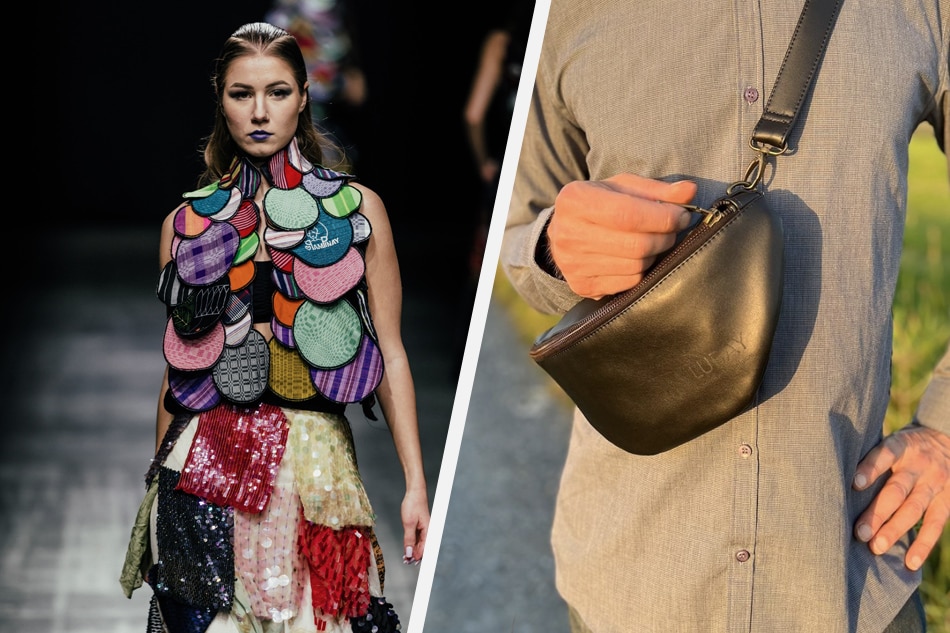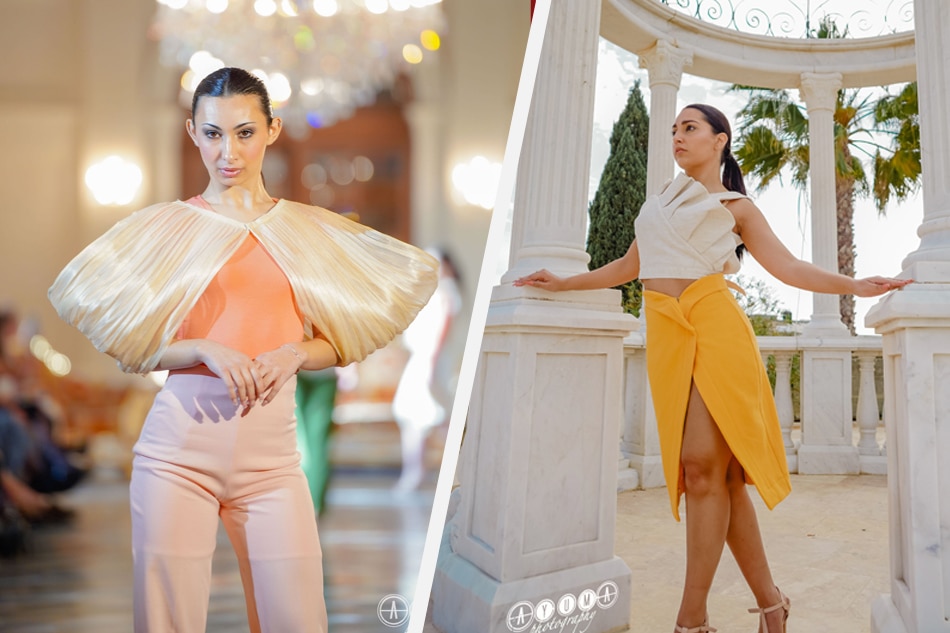In the heart of Europe's fashion scene, four Filipino women are making waves with their sustainable and culturally rich creations. Chona Bacaoco, Pamela Gotangco-Hupp, Soho Francotte, and Mayeth Codoy have brought their unique blend of Filipino heritage and eco-consciousness to the global fashion scene, captivating audiences with their impeccable designs and commitment to sustainability.
The eco-friendly elegance of Chona Bacaoco's designs
Chona Bacaoco's journey from humble beginnings instilled in her a deep sense of resilience and transformation. Her dedication to sustainability stems from her roots and values, shaping her commitment to creating garments that transcend mere fashion and reflect her extraordinary journey from the fields of Guimaras to the runways of Paris, Milan, and New York.
Bacaoco integrates Filipino culture into her sustainable fashion dresses by infusing her personal experiences and deeply rooted values into each garment. She also uses traditional Philippine fabrics like hablon and piña, blending heritage with contemporary design to create a unique fusion appealing to a global audience.
Known for her meticulous attention to detail and commitment to sustainability, Bacaoco utilizes eco-friendly fabrics such as organic cotton, bamboo, tencel, or recycled materials in her dress designs. With meticulous care, she handpicks fabrics and embellishments that minimize ecological footprint, guaranteeing that each piece epitomizes both flair and eco-awareness. Additionally, she crafts zero-waste sustainable handbags from upcycled scrap fabric, further exemplifying her commitment to environmental consciousness.
Bacaoco's brand, HOME by MM Milano, celebrates diversity and fosters a community where values and talent hold equal significance to aesthetics. This approach extends beyond fashion to reshape industries and societies, promoting waste reduction and minimizing carbon footprint in the production process.
Promoting sustainability in the fashion industry, according to Bacaoco, often involves overcoming barriers such as sourcing eco-friendly materials, changing consumer perceptions, and navigating complex supply chains. "I carefully choose fabrics and embellishments. I make sure that I create dresses that not only look beautiful but also embody eco-consciousness and ethical principles. This involves collaborations, initiatives, or partnerships aimed at promoting eco-friendly practices within the fashion industry. I also support local weavers in the Philippines," she said.
Sustainability and artistry of Soho Francotte's Lubay bags
Born in the Philippines in 1986 and later adopted in Belgium, Soho Francotte's journey through life has been a tapestry woven with diverse experiences, each shaping her convictions and passions. From her academic pursuits in philosophy to her blossoming career as a musician, every step has led her closer to her true calling: crafting sustainable and ethically conscious accessories.
Francotte's commitment to sustainability springs from two fundamental inspirations: a dedication to ethical and eco-conscious practices and a recognition of the urgent need for conscious consumerism. She firmly believes in offering cruelty-free and environmentally friendly alternatives to traditional leather bags, considering the detrimental impact of leather production on animals, the planet, and human health. This ethos is embodied in Lubay's choice of sustainable materials like grape skin and cork, offering a compassionate and responsible option for consumers.
Promoting sustainability within the fashion industry, particularly in Belgium and Europe, comes with its share of challenges. Francotte acknowledges the need to shift consumer mindsets away from fast fashion and towards more ethical and environmentally conscious choices. Despite these challenges, Lubay actively engages in social and community initiatives, partnering with organizations like GAIA to support animal rights and soon with a breast cancer awareness NGO.
As a testament to Lubay's ongoing evolution, the brand recently unveiled the LYS bag, which is crafted from wine grape skin, bergamot cork, and orange cork. With its minimalist aesthetic and versatile functionality, it stands as a symbol of the brand's unwavering commitment to sustainability and style.
"At Lubay, we believe that sustainability and aesthetics go hand in hand. We strive to create beautiful, refined bags without compromising on our commitment to environmental and ethical practices," shared Francotte.
Celebrating sustainability and Filipino heritage: The PamPinay fashion journey
Pamela Gotangco-Hupp, the visionary behind PamPinay, has embarked on a remarkable journey that intertwines sustainability with Filipino heritage, culminating in a brand that transcends mere fashion. From her experiences living in Europe to her partnership with indigenous Filipino communities, every step has been guided by a deep commitment to ethical practices and cultural preservation.
Gotangco-Hupp's foray into sustainable clothing was catalyzed by a unique opportunity presented by the Swiss Embassy in Manila. This collaboration sparked her desire to create clothing that reflects both her Filipino roots and Swiss influence. Her time in Europe heightened her awareness of consumption's moral implications, while Switzerland's sustainability practices inspired her to integrate these principles into PamPinay's designs.
"Switzerland’s prioritization of sustainability, which is evident in practices like upcycling and refashioning, inspired me to integrate these principles into PamPinay designs. Initially, our sustainability efforts revolved around adhering to the slow fashion approach and ensuring ethical sourcing of raw materials, with a commitment to fair trade principles for both people and the environment," she said.
Gotangco-Hupp seamlessly integrates Filipino textiles, original art fabric prints, and traditional designs into her clothing. She directly engages with Filipino artisans and communities to source materials, ensuring fair compensation and cultural preservation. PamPinay also incorporates upcycled materials and deadstock fabric into its designs, reducing waste and minimizing environmental impact.
While still in its early stages, Gotangco-Hupp is committed to further enhancing its sustainability efforts. The brand remains open to new methods and approaches that prioritize ethical practices and environmental responsibility.
Embracing slow fashion: Mayeth Codoy's environmental commitment
Norway-based Filipina Mayeth Codoy is not only a talented designer but also a trailblazer in sustainable fashion. With her unwavering commitment to quality, culture, and environmental responsibility, she is driving positive change in the fashion industry, one eco-friendly garment at a time.
Codoy draws inspiration from the abundance of natural materials found in the Philippines. She explains, "We have so many fantastic, natural materials in the Philippines. This inspired me to design and showcase to the world how diverse these materials can be."
A distinguishing feature of Codoy's designs is her incorporation of Filipino culture into every aspect of the production process. She sources most of her materials from the Philippines and always designs with her cultural heritage in mind. Her garments predominantly utilize natural materials such as textiles with pineapple and abaca fibers, as well as bamboo, which offers unique textures suitable for wearable fashion.
Codoy employs innovative draping techniques that minimize fabric waste, emphasizing quality sewing techniques to ensure the durability of her garments. In addressing environmental concerns, she adopts a slow fashion approach, eschewing mass production in favor of meticulously crafted designs that prioritize minimal waste.
Beyond her creative endeavors, Codoy actively engages in social initiatives aimed at supporting the Filipino community, both locally in Norway and internationally. She has participated in events organized by the Philippine embassy in Oslo, showcasing Filipino textiles in contemporary fashion and highlighting their cultural significance.
Navigating sustainability in the fashion industry, particularly in Europe, presents its challenges. Codoy acknowledges that while many may be unfamiliar with the Filipino textile industry, the use of natural materials in her designs has garnered significant interest. Looking ahead, she remains committed to her slow fashion ethos, focusing on quality craftsmanship and offering custom pieces and re-design services.
(Photos courtesy of Chona Bacaoco, PamPinay, Soho Francotte, and Mayeth Codoy)






